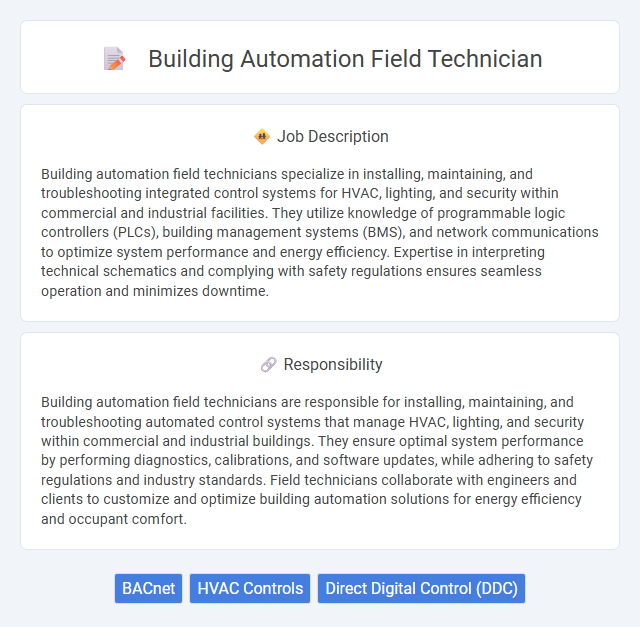
Building automation field technicians specialize in installing, maintaining, and troubleshooting integrated control systems for HVAC, lighting, and security within commercial and industrial facilities. They utilize knowledge of programmable logic controllers (PLCs), building management systems (BMS), and network communications to optimize system performance and energy efficiency. Expertise in interpreting technical schematics and complying with safety regulations ensures seamless operation and minimizes downtime.
Individuals with strong problem-solving skills and a hands-on approach are likely to be well-suited for a building automation field technician role. People who are comfortable working in diverse environments and can handle physical tasks may find this job fitting their abilities. Those who prefer routine office work without field activity might face challenges adapting to the dynamic and technical nature of this position.
Qualification
Building automation field technicians require a strong foundation in electrical engineering, HVAC systems, and programmable logic controllers (PLCs). Proficiency in troubleshooting, installing, and maintaining building control systems including sensors, actuators, and network communication protocols such as BACnet and Modbus is essential. Certifications like Certified Control Systems Technician (CCST) or relevant manufacturer-specific training enhance job performance and career advancement opportunities.
Responsibility
Building automation field technicians are responsible for installing, maintaining, and troubleshooting automated control systems that manage HVAC, lighting, and security within commercial and industrial buildings. They ensure optimal system performance by performing diagnostics, calibrations, and software updates, while adhering to safety regulations and industry standards. Field technicians collaborate with engineers and clients to customize and optimize building automation solutions for energy efficiency and occupant comfort.
Benefit
Building automation field technician jobs likely offer competitive salaries and comprehensive benefits packages, including health insurance, retirement plans, and paid time off. Employees may benefit from opportunities for professional development and certification, increasing job security and career growth prospects. The role probably provides hands-on experience with advanced technologies, enhancing technical skills and industry relevance.
Challenge
Building automation field technician jobs likely involve complex troubleshooting tasks that require adapting to rapidly evolving technologies and diverse building systems. The challenge often lies in diagnosing intricate problems within HVAC, lighting, and security controls while ensuring minimal downtime and maintaining safety standards. Field technicians probably face pressure to stay updated with emerging protocols and software to efficiently manage automated systems across varied environments.
Career Advancement
Building automation field technicians play a critical role in installing, maintaining, and troubleshooting automated control systems for HVAC, lighting, and security in commercial buildings. Gaining expertise in programmable logic controllers (PLCs), building management systems (BMS), and IoT integration opens pathways to advanced roles such as system design engineer or operations manager. Continuous professional development and certifications like Certified Energy Manager (CEM) significantly enhance career advancement opportunities in this evolving field.
Key Terms
BACnet
Building automation field technicians specialize in the installation, calibration, and maintenance of BACnet-based systems that control HVAC, lighting, and security within commercial properties. Proficiency in BACnet protocols ensures seamless communication between various building automation devices, enhancing energy efficiency and system integration. Skilled technicians troubleshoot BACnet network issues, optimize control algorithms, and support system upgrades to maintain optimal building performance.
HVAC Controls
Building automation field technicians specializing in HVAC controls install, calibrate, and maintain complex systems that regulate temperature, humidity, and airflow within commercial and industrial buildings. Expertise in programmable logic controllers (PLCs), HVAC sensors, and control software is essential for optimizing system efficiency and reducing energy consumption. Technicians troubleshoot system faults, perform preventative maintenance, and ensure compliance with environmental and safety regulations.
Direct Digital Control (DDC)
Building automation field technicians specializing in Direct Digital Control (DDC) systems are responsible for installing, programming, and maintaining advanced digital controllers that regulate HVAC, lighting, and other building systems. They ensure optimal performance by calibrating sensors, troubleshooting communication networks, and updating firmware on controllers from leading manufacturers such as Siemens, Honeywell, and Johnson Controls. Proficiency in BACnet, Modbus, and LonWorks protocols is essential for integrating DDC systems into comprehensive building management platforms.
 kuljobs.com
kuljobs.com